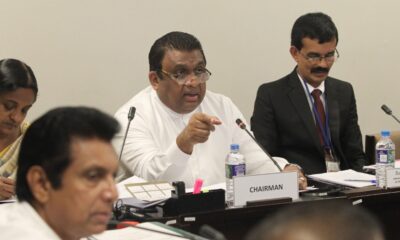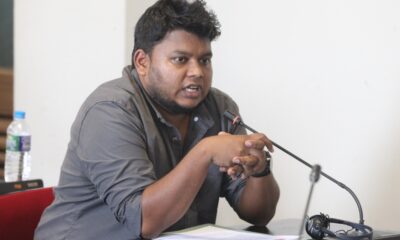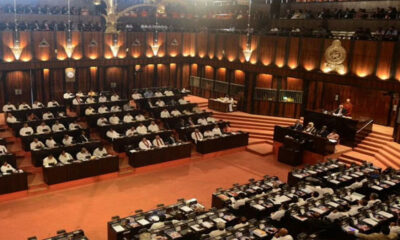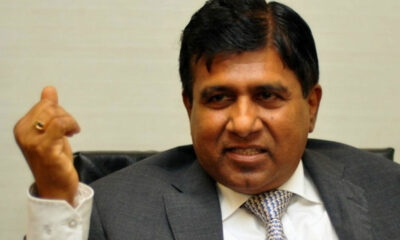Workshop on Indian cinema inaugurated
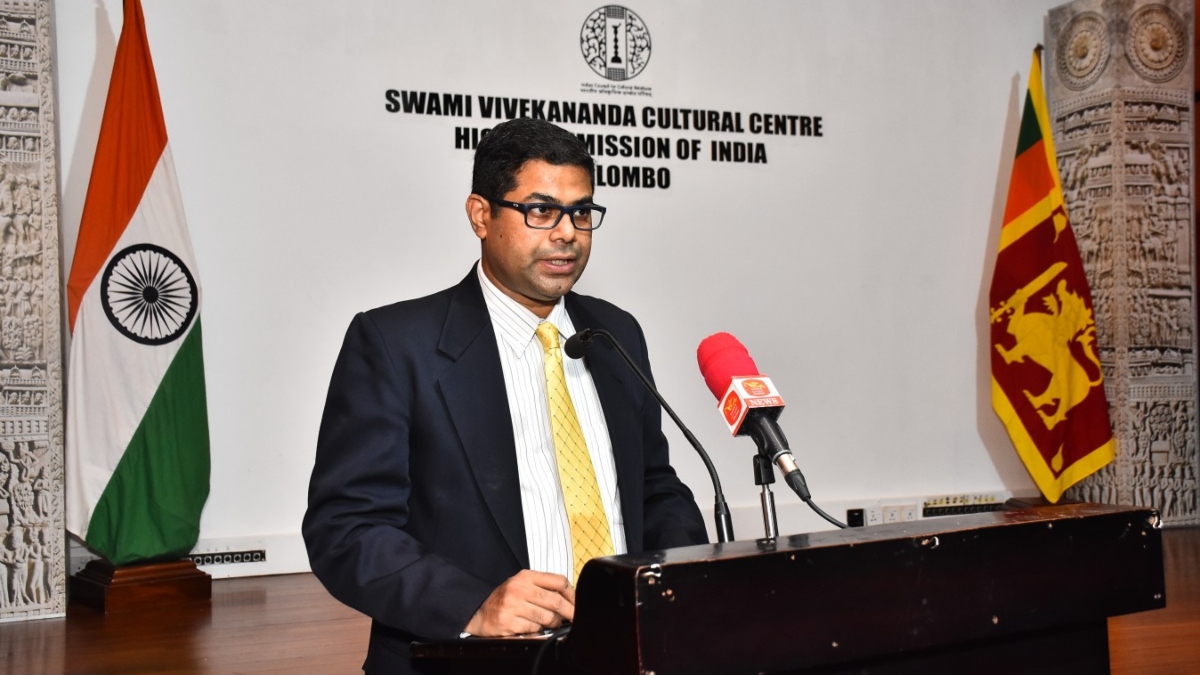
A workshop on Indian cinema was inaugurated at the Swami Vivekananda Cultural Centre in Colombo on April 28.
State Minister of Urban Development and Housing – Arundika Fernando was present on the occasion.Mr. Vinod K Jacob, Deputy High Commissioner participated in the inauguration and welcomed the delegation led by the highly decorated director, actor, screenwriter and lyricist from Kannada cinema, Dr. Nagathihalli Chandrashekaran to the workshop.
Speaking on the occasion, Deputy High Commissioner noted, “At a time when India and Sri Lanka are celebrating 75 years of diplomatic relations, it is indeed timely that we are having this workshop.” Wishing that the workshop would contribute to deepening people to people ties, he highlighted six main observations during the course of his speech.First, every year, more than 2000 films are made in India. In 2011, the total number of cinema tickets sold were 3.5 billion. The history of Indian cinema is more than 100 years old. The pioneering filmmaker was Dadasaheb Phalke, who is known as the father of Indian cinema, gave India the first full length silent feature film titled RAJA HARISHCHANDRA on 3 May 1913. Through this long journey, Indian cinema has enriched Indian society and vice versa. The movies have tackled issues like nationalism, women’s and children’s rights, caste, religion, class and the like.
Second, looking at the more than 100-year-old journey of Indian cinema and how we responded to the restrictions of Covid 19, there are some interesting trends. The fact that RRR’s Naatu Naatu won the Best Original track at the latest Academy Awards is a testimony to the ability of Indian cinema to innovate. He quoted a report which estimated that Hindi theater-going universe shrank by 21.5 per cent compared to pre-pandemic levels. In contrast, most South Indian languages have shown stability or growth, with Kannada gaining the most at 25%, from 1.16 crore to 1.45 crore.
Third, it is important to recognize that commercial success is an essential element of the progress of the Indian cinema. Equally, this is a fluid concept. Among the earliest examples in this regard is the success of the 1951 movie AWARA which set a record in terms of collection, was overtaken in 1952 itself with collections for the movie AAN. This year, the movie PATHAAN has set fresh records. However, related to this is the aspect of success in terms of creative content which cannot only be measured by collections. Convergence of these two aspects namely the commercial and the creative depends in large measure on the audience.
Fourth, Kannada cinema has come a long way since the first talkie SATI SULOCHANA in the 1930s. Its output has been prolific and contributed to the vitality of Indian cinema and indeed Indian society. The KGF series is fresh in everyone’s minds but the workshop will educate about the versatility of Kannada cinema.
Fifthly, the ecosystem that enables Indian cinema flows from the freedom of speech and expression which is a fundamental right in the Indian constitution. The Cinematograph Act of 1952 is the main piece of legislation in this regard. As is normal in any other jurisdiction, there are structures and mechanisms that govern censorship, copyright and piracy including digital piracy.Finally, the Government and people of India have stood by the people of Sri Lanka and have given support to the tune of USD 4 billion. This has been in line with the Government’s ‘Neighbourhood First’ policy. It is important that Sri Lankan friends appreciate that such a policy can be successful only if the people of India support these initiatives. The Indian people continue to stand in solidarity with the people of Sri Lanka.
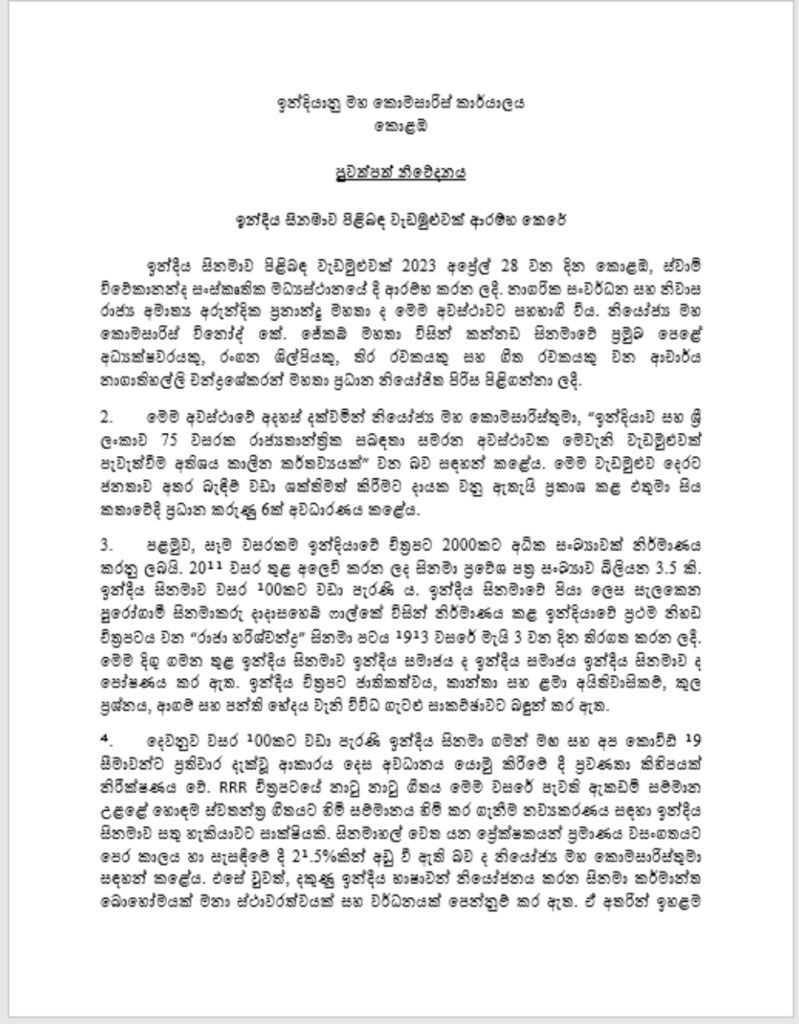
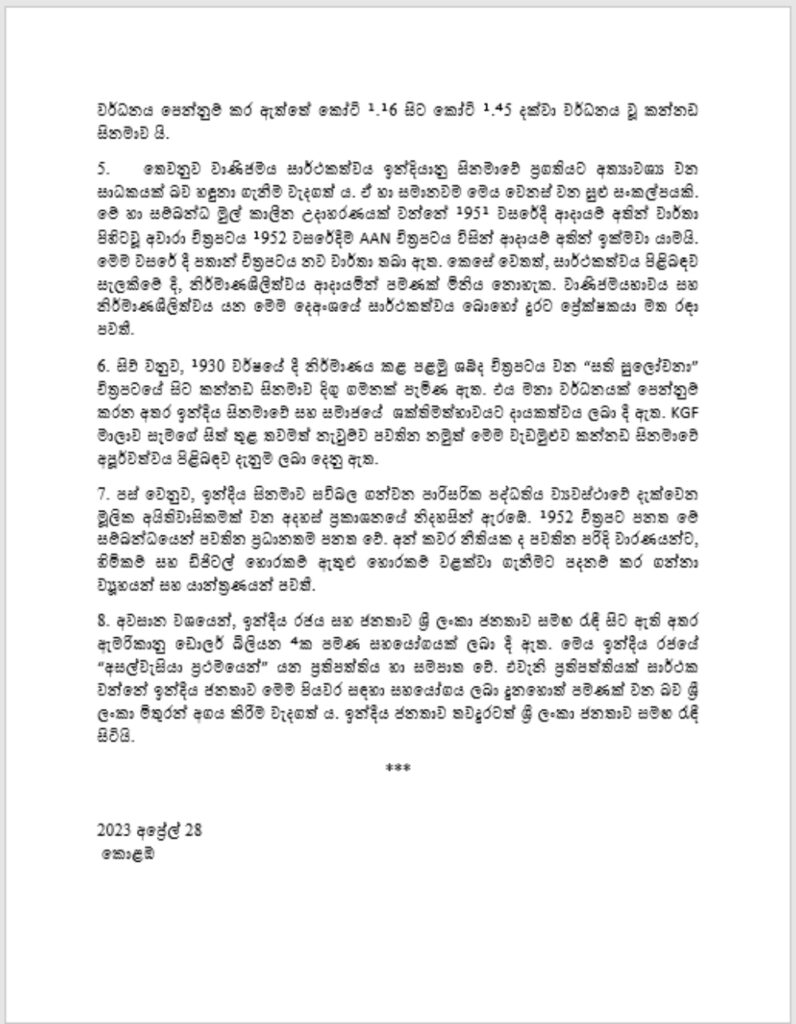
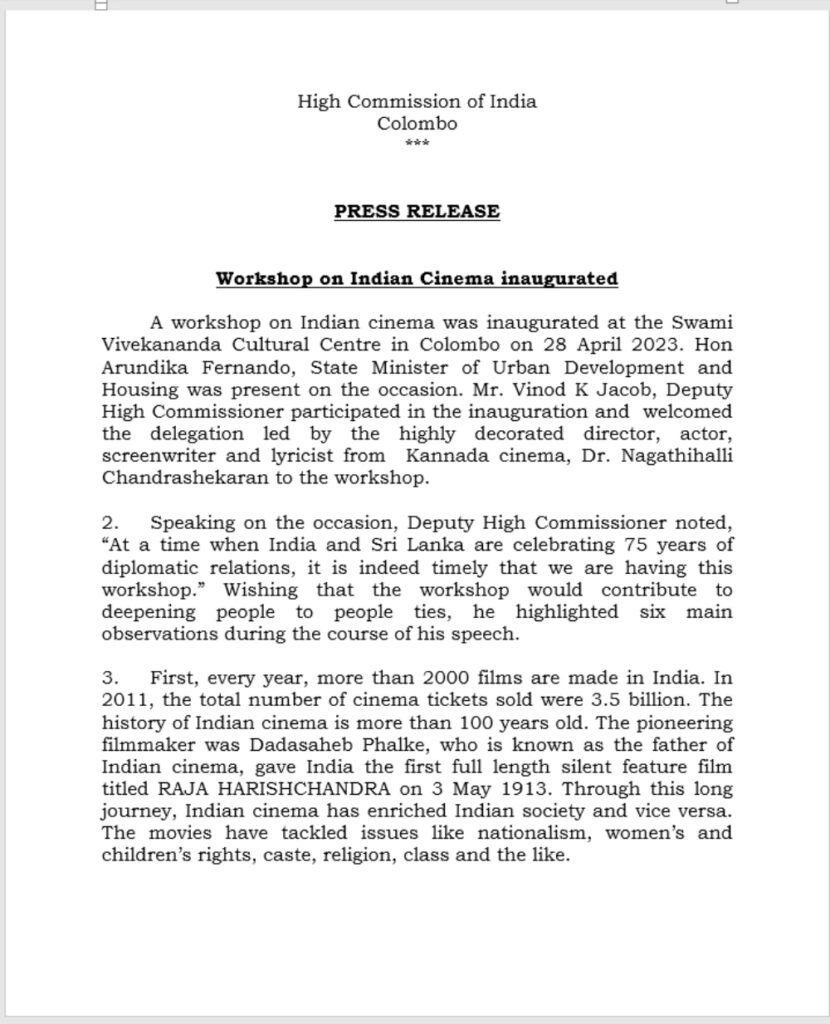
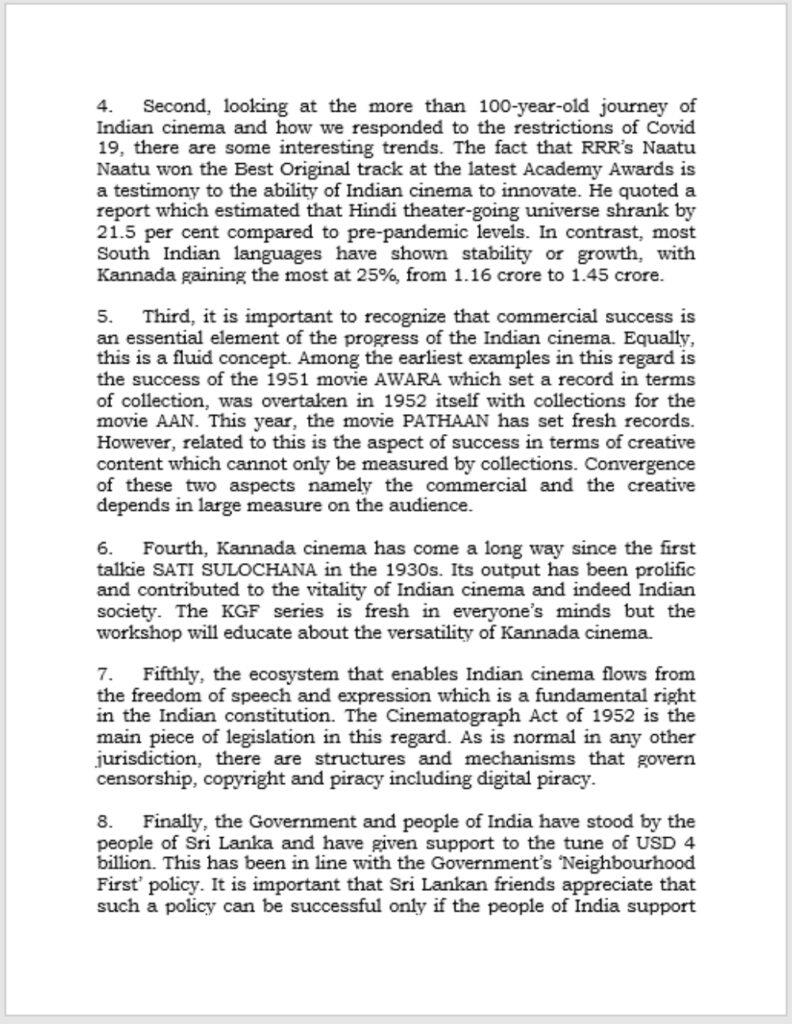
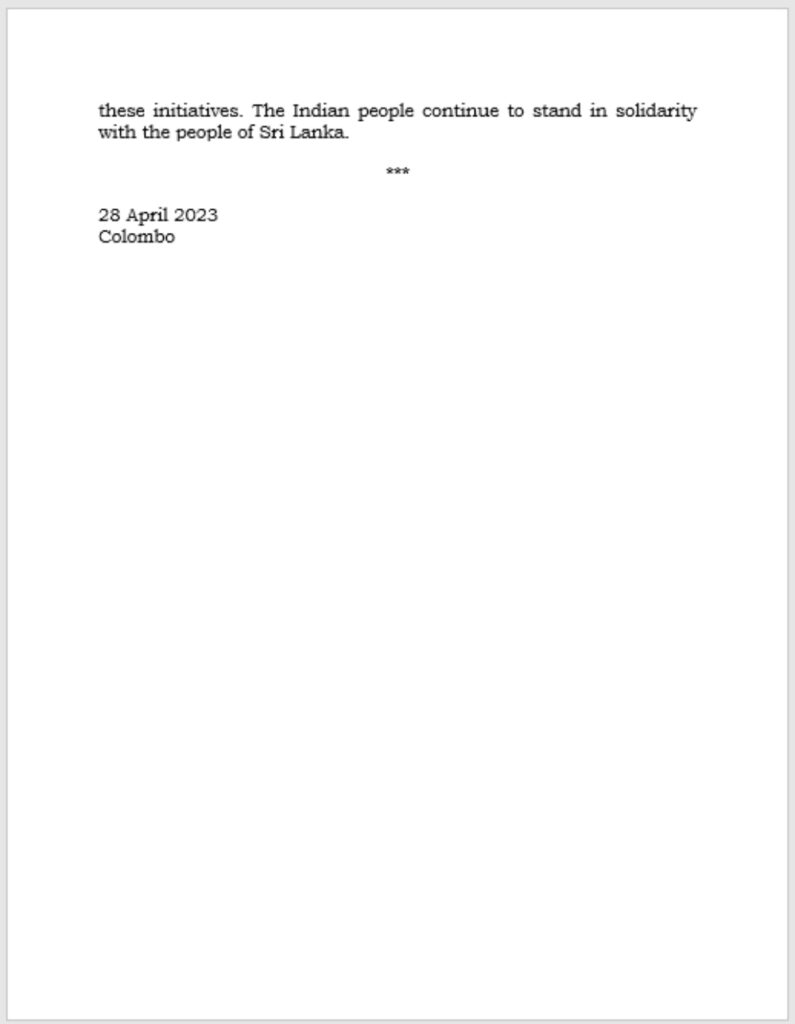
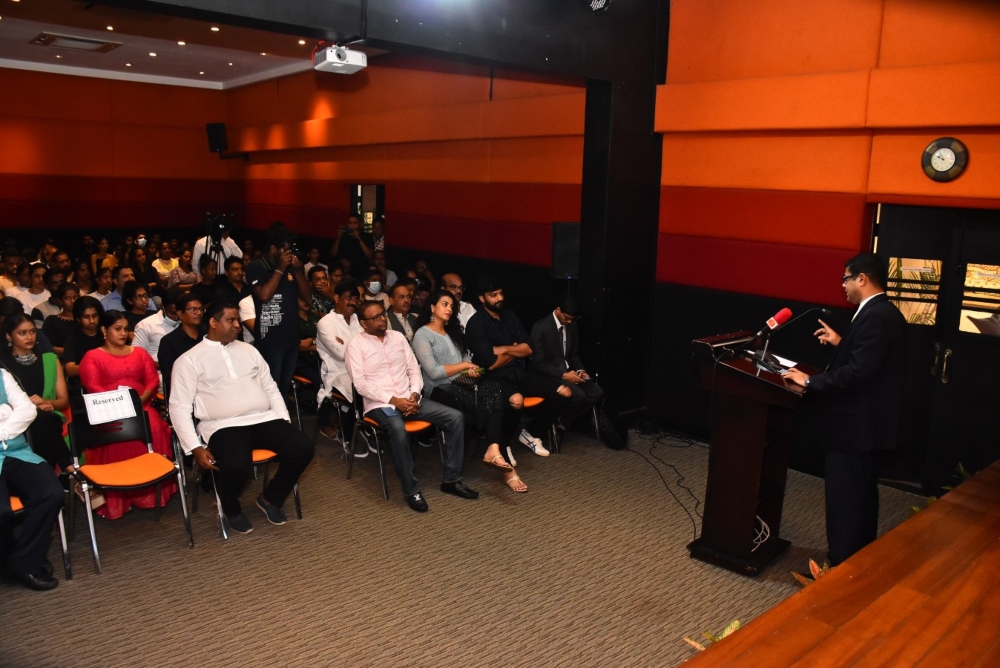
YOU MAY LIKE
-

449,979 families should be removed from Samurdhi subsidy – COPA
-

Computer faculty at UoK hasn’t issued results in 12 months!
-

Parliament votes in favour of IMF EFF
-

China assures to set up refinery in Sri Lanka
-

Broadcasting Authority Bill to be given to media institutions
-

CID launches probe into missing Rs.5mn from Central Bank!
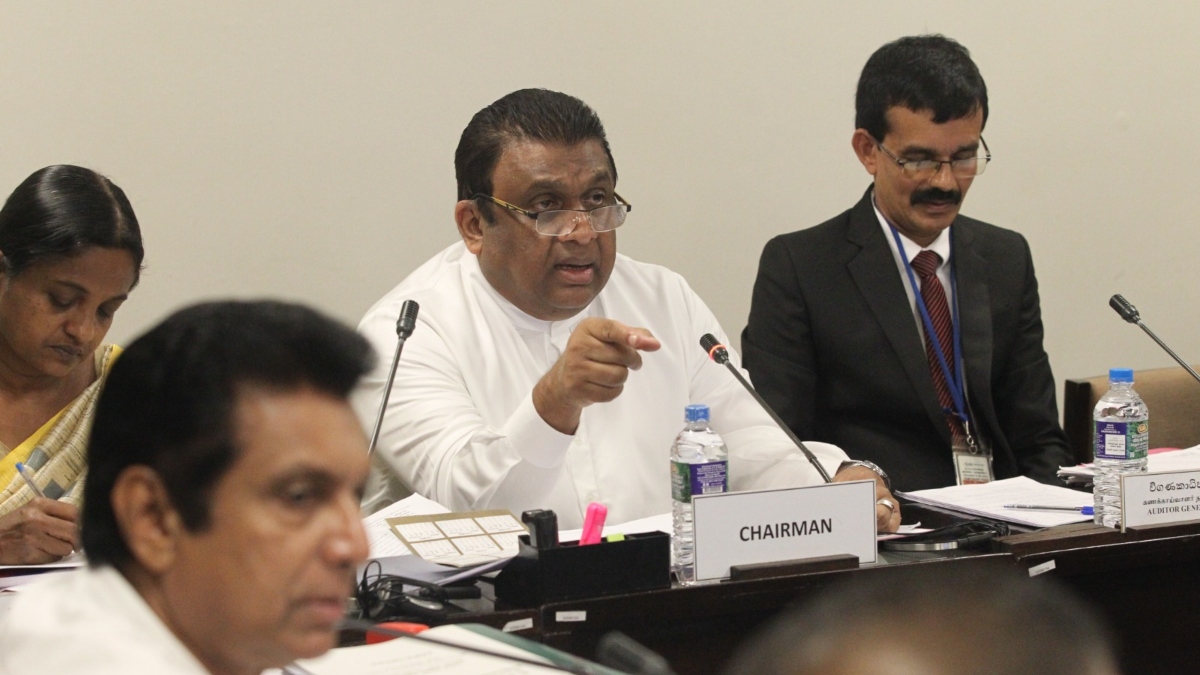
Nearly 33% of the families receiving Samurdhi benefits are families that should not be entitled to Samurdhi benefits – COPA disclose
COPA disclosed that almost 33% of the families receiving the Samurdhi benefit are families who should not be entitled to the Samurdhi benefit, and a similar percent of families are the families who should be entitled to the Samurdhi benefit who are not entitled to the Samurdhi benefit.
According to a survey conducted covering the entire island from 2015 to 2017, this information was discovered and it was stated that 449,979 families should be removed from the Samurdhi subsidy.
Also, the officials of the National Audit Office said that an informality is observed in the selection of Samurdhi beneficiaries.
This was disclosed when the Committee on Public Accounts (COPA) Chaired by Lasantha Alagiyawanna, met recently (25) in Parliament to review the matters included in the reports of the Auditor General for the years 2019, 2020 and 2021 and the current performance of the Department of Samurdhi Development.
Accordingly, it was also disclosed that some of the Samurdhi beneficiaries who received the monthly benefits remitted to the Prajamula Banks, kept them in their bank accounts for a long period of time and according to the surveys, the amount kept in the savings accounts of 2433 beneficiaries in 41 domains of 10 Prajamula Banks amounted to Rs. 59,951,537.
Moreover, the empowerment of the beneficiaries was also discussed at the Committee meeting and the COPA Chair was of the vies that it was observed that there has been no proper program regarding the empowerment of the beneficiaries.
Furthermore, The Committee inquired about the inclusion of the number of employees there when the Samurdhi Authority was made a department, and since the correct data was not submitted, it was recommended to recall this department before COPA on the 26th of May, and the Chair further said that all the correct information about this would be required on that day.
Also, the financial subsidies received in the year 2022 under the assistance of the World Bank were also discussed here and the future plans of this department were also inquired about according to the updates planned to be done from the coming July. As no successful program was presented regarding the future plans, when the Samurdhi Development Department comes before this committee on May 26th, COPA also recommended that a successful program be presented.
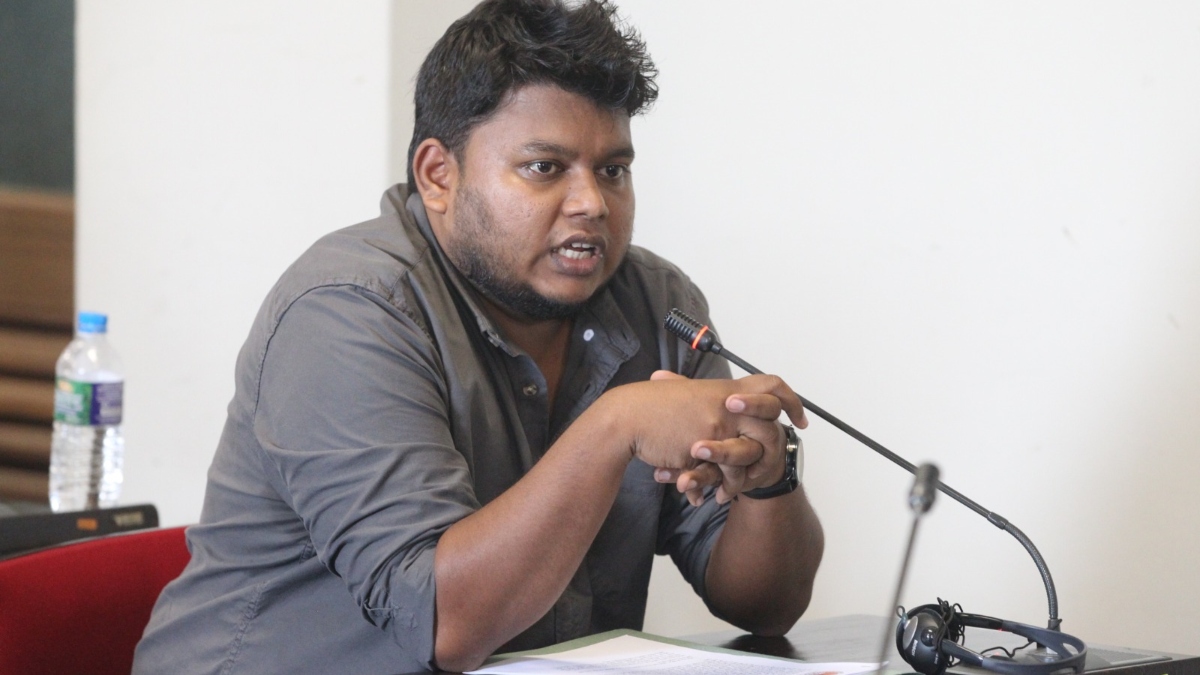
Mr. Wasantha Mudalige, Convener of the Inter University Students’ Federation (IUSF) disclosed that the Faculty of Computing and Technology – University of Kelaniya has not issued results for 12 months and it has therefore, caused students’ great distress.
He stated that appearing before the Select Committee of Parliament to make suitable recommendations for the expansion of higher education opportunities in Sri Lanka Chaired by Minister Hon. (Dr.) Wijeyadasa Rajapakshe, PC, met in Parliament recently (25).
The Select Committee of Parliament to make suitable recommendations for the expansion of higher education opportunities in Sri Lanka had called the Inter University Students’ Federation before the Committee to discuss existing concerns pertaining to higher education and to look into potential proposals and the way forward for the expansion of higher education opportunities.
Whilst emphasizing that education should be a right and not a privilege, the Convener of the IUSF pointed out that many students drop out of university as they cannot hold against the pressures arising due to the shortcomings within the higher education system.
Moreover, it was also disclosed that Faculty of Allied Health Science University of Peradeniya are yet to put forward the academic calendar and that the Sabaragamuwa University are yet to hold examinations.
Accordingly, the Committee decided to call for the Ministry of Higher Education, Vice Chancellors of all Universities, representatives of the Inter University Students’ Federation and all other relevant parties to appear before the Committee in order to collectively discuss matters arising and a way forward.
Committee Members (Dr.) (Ms.) Seetha Arambepola, Members of Parliament Rauff Hakeem, Anura Priyadarshana Yapa, Eran Wickramaratne, (Prof.) Charitha Herath and Dayasiri Jayasekara were present at the Committee meeting held.
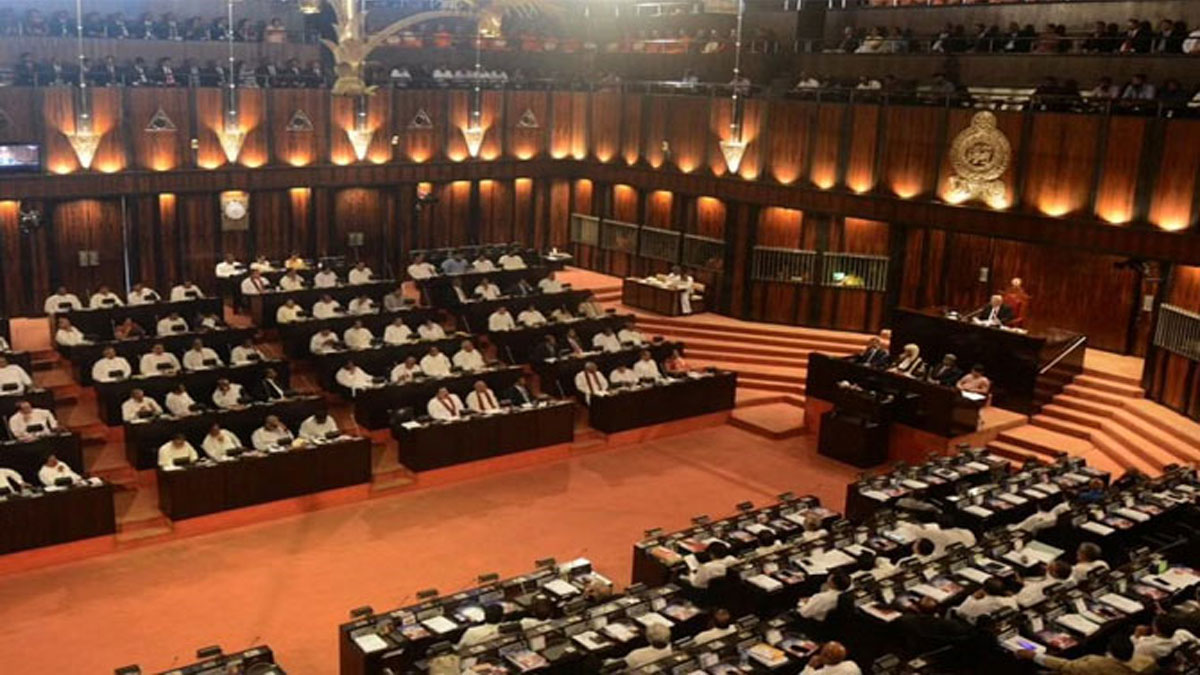
Resolution for the implementation of the arrangement under the EFF of the IMF for Sri Lanka passed by a majority of Votes
The Resolution for the implementation of the arrangement under the Extended Fund Facility (EFF) of the IMF for Sri Lanka was passed by a majority of 95 Votes with 120 voting in favour and 25 voting against it.
The debate in this regard was held in Parliament on 26th 27th and 28th
ADVERTISEMENT



